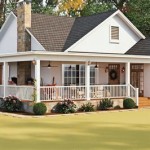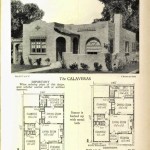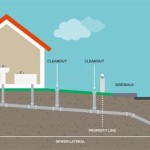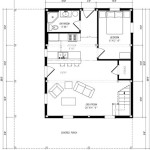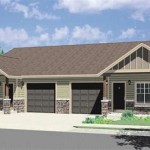Exploring the Benefits of ICF House Plans
Insulated Concrete Forms (ICFs) are revolutionizing the construction industry, offering a compelling alternative to traditional building methods. ICFs are essentially stay-in-place formwork for concrete walls, made from interlocking modular units that are dry-stacked and filled with concrete. This system not only provides structural support but also creates a highly insulated building envelope. As such, ICF house plans are gaining significant traction, offering numerous advantages for homeowners and builders alike. This article will delve into the key benefits of choosing an ICF house plan, examining its impact on energy efficiency, structural integrity, comfort, and long-term value.
Enhanced Energy Efficiency with ICFs
One of the most significant advantages of ICF construction is its superior energy efficiency. The high insulation value of ICF walls, typically ranging from R-20 to R-25 or even higher, dramatically reduces heat transfer. This means that during the winter months, ICF homes retain heat more effectively, minimizing the need for heating systems. Conversely, in the summer, they keep the interior cool, reducing the reliance on air conditioning. This translates into substantial savings on energy bills, contributing to a lower carbon footprint and a more sustainable lifestyle. The continuous insulation provided by ICFs eliminates thermal bridging, a common issue in traditional wood-frame construction where heat can easily escape through studs and framing members. The airtightness of ICF construction further enhances energy efficiency by minimizing air leakage, preventing drafts, and maintaining consistent indoor temperatures.
The effects of this enhanced energy efficiency extend beyond simple cost savings. Reduced energy consumption alleviates the strain on local power grids, contributing to a more stable and reliable energy supply. Furthermore, the improved indoor environment resulting from consistent temperatures and reduced drafts can lead to improved health and well-being for occupants. ICFs assist in creating buildings that are compliant with stringent energy codes and meet the requirements for green building certifications, such as LEED, further enhancing the value and marketability of the property. The long-term operational savings associated with an ICF house plan make it a financially sound investment, offsetting the initial cost premium over time.
The thermal mass inherent in concrete further contributes to the energy efficiency of ICF homes. Concrete has a high density and can absorb and store heat energy. During the day, as the ambient temperature rises, the concrete walls absorb heat, delaying the temperature increase inside the home. At night, when the temperature drops, the stored heat is slowly released, helping to maintain a comfortable indoor temperature. This thermal mass effect reduces temperature fluctuations and minimizes the need for active heating and cooling systems, further reducing energy consumption and improving overall energy performance.
Superior Structural Strength and Durability
ICF construction offers exceptional structural strength and durability, making it a resilient choice for homes. The concrete core of an ICF wall provides inherent resistance to high winds, seismic activity, and other natural disasters. ICF homes are significantly more resistant to damage from hurricanes, tornadoes, and earthquakes compared to conventionally built structures. The reinforced concrete core acts as a robust barrier against external forces, protecting occupants and minimizing property damage. This enhanced structural integrity can also translate into lower insurance premiums, as insurance companies recognize the reduced risk associated with ICF construction.
In addition to their resistance to natural disasters, ICF walls are also highly durable and resistant to deterioration. The concrete is protected from the elements by the insulating foam, preventing moisture intrusion and minimizing the risk of rot, decay, and insect infestation. This significantly extends the lifespan of the building, reducing the need for costly repairs and maintenance over time. The inert nature of concrete also makes it resistant to fire, providing an added layer of safety for occupants. ICF walls have a high fire-resistance rating, meaning they can withstand prolonged exposure to fire without collapsing, providing valuable time for evacuation and firefighting efforts.
The durability of ICFs also contributes to the long-term sustainability of the building. By minimizing the need for repairs and replacements, ICF construction reduces the consumption of resources and the generation of waste associated with building maintenance. This makes ICF homes a more environmentally responsible choice than traditionally built structures. Furthermore, the robust nature of ICF construction makes it suitable for a wide range of geographic locations and climates, including areas prone to extreme weather conditions. The versatility of ICF allows for the construction of homes that can withstand the challenges of their environment, ensuring the safety and security of occupants for generations to come.
Improved Indoor Comfort and Air Quality
ICF house plans lead to improved indoor comfort and air quality. The airtightness of ICF construction, combined with the thermal mass of concrete, creates a stable and comfortable indoor environment. The consistent temperature and reduced drafts eliminate uncomfortable temperature fluctuations and hot or cold spots, creating a more pleasant living space. The superior sound insulation of ICF walls also contributes to indoor comfort by reducing noise transmission from outside sources. This can be particularly beneficial in urban areas or near busy roads, where noise pollution can be a significant nuisance. The dense concrete core of ICF walls effectively blocks sound waves, creating a quieter and more peaceful indoor environment.
Beyond comfort, ICF construction can also improve indoor air quality. The airtightness of ICF walls helps to prevent the infiltration of allergens, pollutants, and other harmful substances from outside. This can be particularly beneficial for individuals with allergies or respiratory sensitivities, as it reduces exposure to triggers that can exacerbate their symptoms. The use of moisture-resistant materials in ICF construction also helps to prevent the growth of mold and mildew, which can contribute to poor indoor air quality and health problems. By creating a healthier and more comfortable indoor environment, ICF construction enhances the well-being of occupants and promotes a higher quality of life.
The stable indoor temperature and humidity levels in ICF homes can also contribute to improved energy efficiency by reducing the strain on heating and cooling systems. When indoor temperatures are more consistent, energy is not wasted trying to compensate for temperature fluctuations. This translates to a reduction in energy consumption and lower utility bills, making the home more affordable to operate. Furthermore, the improved indoor air quality can reduce the need for air purifiers and other devices that consume energy, further contributing to energy savings. The combination of improved comfort, air quality, and energy efficiency makes ICF house plans a compelling choice for homeowners who prioritize both their well-being and their budget.
The reduced air infiltration typical of ICF construction allows for more effective control of ventilation. By utilizing a controlled ventilation system, such as a heat recovery ventilator (HRV) or energy recovery ventilator (ERV), fresh, filtered air can be introduced into the home while stale air is exhausted. This ensures a constant supply of clean, healthy air without compromising energy efficiency. HRVs and ERVs also help to regulate humidity levels, preventing excessive moisture buildup that can lead to mold growth and other problems. This controlled ventilation approach further enhances the comfort, air quality, and overall healthiness of the indoor environment in an ICF home.

The Benefits Of An Icf Home 2024 04 01 Walls Ceilings
Concrete Icf House Plans 9 Tricks To Get The Most Out Of Your Floor Plan Collection

10 Pros Cons Of Icfs In Self Build Homes Incollective Works

The Benefits Of An Icf Home 2024 04 01 Walls Ceilings

The Benefits Of An Icf Home 2024 04 01 Walls Ceilings

Icf Construction What You Need To Know About An Home

Exploring The Acoustic Benefits Of Icf Building Blocks

Icf Construction What You Need To Know About An Home

Icf Construction What You Need To Know About An Home

Stronger Foundations With Icfs Reinforcing Home Construction Alleguard Foam Solutions
Related Posts

